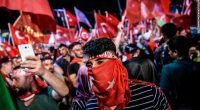Fethullah Gulen Criticizes Gaza Flotilla

Date posted: September 29, 2010
Wall Street Journal recently interviewed IDC’s honorary president Mr. Fethullah Gulen. He has been living a reclusive life and this is the first time he talked to American media.
Reclusive Turkish Imam Criticizes Gaza Flotilla
By JOE LAURIA
SAYLORSBURG, Pa.—Imam Fethullah Gülen, a controversial and reclusive U.S. resident who is considered Turkey’s most influential religious leader, criticized a Turkish-led flotilla for trying to deliver aid without Israel’s consent.
Speaking in his first interview with a U.S. news organization, Mr. Gülen spoke of watching news coverage of Monday’s deadly confrontation between Israeli commandos and Turkish aid group members as its flotilla approached Israel’s sea blockade of Gaza. “What I saw was not pretty,” he said. “It was ugly.”
Mr. Gülen said organizers’ failure to seek accord with Israel before attempting to deliver aid “is a sign of defying authority, and will not lead to fruitful matters.”
Mr. Gülen’s views and influence within Turkey are under growing scrutiny now, as factions within the country battle to remold a democracy that is a key U.S. ally in the Middle East. The struggle, as many observers characterize it, pits the country’s old-guard secularist and military establishment against Islamist-leaning government workers and ruling politicians who say they seek a more democratic and religiously tolerant Turkey. Mr. Gülen inspires a swath of the latter camp, though the extent of his reach remains hotly disputed.
His words of restraint come as many in Turkey gave flotilla members a hero’s welcome after two days of detention in Israel. Prime Minister Recep Tayyip Erdogan of the ruling Justice and Development Party condemned Israel’s moves as “bullying” and a “historic mistake.”
Mr. Gülen said he had only recently heard of IHH, the Istanbul-based Islamic charity active in more than 100 countries that was a lead flotilla organizer. “It is not easy to say if they are politicized or not,” he said. He said that when a charity organization linked with his movement wanted to help Gazans, he insisted they get Israel’s permission. He added that assigning blame in the matter is best left to the United Nations.
Mr. Gülen has long cut a baffling figure, as critics and adherents have sparred over the nature of his influence in Turkey and the extent of his reach. Leading a visitor on Wednesday past his front corridor—adorned with a map of Turkey, a verse from the Quran and a photograph of a Turkish F-16 jet over the Bosphorus—he portrayed himself an apolitical teacher. “I do not consider myself someone who has followers,” he said.
Born in eastern Turkey in 1941, Mr. Gülen became a state-licensed imam at 17, after three years of formal education and studies with Sufi masters. In a Turkey largely under the sway of a military-secularist establishment, he built a national organization of Islamic study and boarding halls, gaining support of many wealthy Muslims but at times running afoul of the law.
While in the U.S. in 1999 for medical treatment, he was charged in Turkey with attempting to create an Islamic state— anathema under Turkey’s secularist constitution. He stayed in Pennsylvania, where he now lives on a 25-acre estate in the Pocono Mountains. Over the years, he said, he has left the estate twice.
Mr. Gülen preaches nonviolence, dialogue between Western and Muslim worlds, and an educational tradition that combines study of science and Islam. His newspaper columns, weekly Internet sermons and other messages have been collected into more than 60 books. His adherents number, by various estimates, three million to eight million.
Followers have established hundreds of schools in more than 100 countries and run an insurance company and an Islamic bank, Asya, that its 2008 annual report said had $5.2 billion in assets. They own Turkey’s largest daily newspaper, Zaman; the magazine Aktion; a wire service; publishing companies; a radio station and the television network STV, according to Helen Rose Ebaugh, a University of Houston sociologist and author of “The Gülen Movement.” She says followers donate up to one-third of their income to independent Gülen-linked foundations.
Ms. Ebaugh said Mr. Gülen doesn’t sit on the boards of Asha bank nor any foundation or editorial boards of Gülen-sympathetic magazines, newspapers or television stations. In the interview, the imam said he had no financial interest in any holdings.
Mr. Gülen’s detractors see him as a cult-like leader whose empire aims to train an Islamic elite who will one day rebuild the Turkish state. Soner Cagaptay, a Gülen critic who is a Turkey analyst at the Washington Institute for Near East Policy, says the Turkish police force may be largely influenced by the imam through Gülen sympathizers in key positions—effectively creating a counterbalance to Turkey’s powerful military, a secularist bastion.
“I am not a leader of a faction or someone who would cause some state officials to follow me despite their official duties,” Mr. Gülen said in the interview.
The U.S. has “immense ambivalence” about Mr. Gülen, said Graham Fuller, an ex-Central Intelligence Agency officer who is a resident consultant at the Rand Corp. in British Columbia.
“On the one hand they do perceive him as very moderate and doing many positive things,” Mr. Fuller said. But Washington has long thrown its lot behind the secularist followers of Mustafa Kemal Ataturk, he says, viewing them “as the only narrative to what Turkish politics is all about.”
The U.S. State Department declined to comment about Mr. Gülen for this article.
In 2007, U.S. Homeland Security moved to deny Mr. Gülen permanent-resident status in the U.S., rejecting his claim of exceptional ability as an educator. “The record contains overwhelming evidence that plaintiff is primarily the leader of a large and influential religious and political movement with immense commercial holdings,” the government wrote.
Mr. Gülen won on appeal after getting 29 letters of support, including one from Mr. Fuller.
The imam disputed Homeland Security’s characterization. He goes only so far as to provide guidance to those who ask, he said.
The 2002 election of the Justice and Development Party, or AKP, opened a new era for Mr. Gülen and those he inspires, given their common foe in the military-secularist establishment.
The AKP says it has no political ties to Mr. Gülen. The imam says critics have linked him, falsely, to Turkey’s current and previous leaders. “I do not have and have never had any relationship with a movement that has political aspirations,” he said. “I am just a Turkish citizen.”
Last month, Mr. Gülen’s followers founded the Assembly of Turkic American Federations in Washington, a lobbying and umbrella organization for some 180 local non-profit foundations around the U.S. involved in education and culture.
An English-language Turkish newspaper reported that Mr. Gülen has told his followers they couldn’t visit him on his Poconos estate if they didn’t first donate to their local congressman. Mr. Gulen denies making the remark.
Mr. Gülen said that for Muslims, benefiting their community is both an Islamic and humanitarian duty, and that he would be happy if those who respect him support their lawmakers in the name of democracy and humanitarianism.
“I hear that some people in the United States consider Turkey as sitting at the epicenter of radicalism,” Mr. Gülen said. The new federation’s lobbying would aim “to reflect through sincere, pro-dialog and open-minded people the true nature of Turkey’s realities.”
Write to Joe Lauria at newseditor@wsj.com.
Source: Wall Street Journal , June 4, 2010
Tags: Fethullah Gulen | Interviews with Fethullah Gulen | Israel |
























